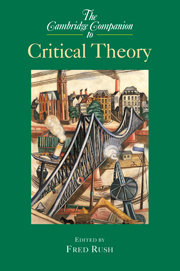Book contents
- Frontmatter
- Introduction
- 1 Conceptual foundations of early Critical Theory
- 2 Benjamin, Adorno, and the decline of the aura
- 3 The dialectic of enlightenment
- 4 The marriage of Marx and Freud
- 5 Dialectics and the revolutionary impulse
- 6 “The dead speaking of stones and stars”
- 7 Critique, state, and economy
- 8 The transcendental turn
- 9 The politics of Critical Theory
- 10 Critical Theory and the analysis of contemporary mass society
- 11 Critical Theory and poststructuralism
- 12 The very idea of a critical social science
- 13 A social pathology of reason
- Select bibliography
- Index
11 - Critical Theory and poststructuralism
Habermas and Foucault
Published online by Cambridge University Press: 28 May 2006
- Frontmatter
- Introduction
- 1 Conceptual foundations of early Critical Theory
- 2 Benjamin, Adorno, and the decline of the aura
- 3 The dialectic of enlightenment
- 4 The marriage of Marx and Freud
- 5 Dialectics and the revolutionary impulse
- 6 “The dead speaking of stones and stars”
- 7 Critique, state, and economy
- 8 The transcendental turn
- 9 The politics of Critical Theory
- 10 Critical Theory and the analysis of contemporary mass society
- 11 Critical Theory and poststructuralism
- 12 The very idea of a critical social science
- 13 A social pathology of reason
- Select bibliography
- Index
Summary
At the center of the contentious debates that have engaged second generation Critical Theorists and poststructuralists since the publication of Habermas's “Modernity: An Unfinished Project” (1980) and The Philosophical Discourse of Modernity (1985) lie several embattled epistemological and political presuppositions: on the one hand, the normative validity claims underpinning Habermas's theory of communicative action; on the other, the antifoundationalism of poststructuralism. In the wake of modernity's “legitimation crisis,” Habermas argued for the retention of the Enlightenment legacy of reason, vowing to complete the unfinished project of political modernity, whose anatomy was radically different from the aesthetic modernity initiated by Baudelaire, from Nietzsche's aestheticism, or even from a “presentist” culture of the “now.” Poststructuralist thinkers, by contrast, rejected the principles of universalism and consensus formation, together with the defunct narratives of rationality, legitimacy, and normative justification, either in the name of a postmodern agonistic pragmatism (Lyotard), a postmetaphysical deconstruction (Derrida), or a critical genealogy of the historical vicissitudes of reason (Foucault).
- Type
- Chapter
- Information
- The Cambridge Companion to Critical Theory , pp. 280 - 309Publisher: Cambridge University PressPrint publication year: 2004
- 1
- Cited by



